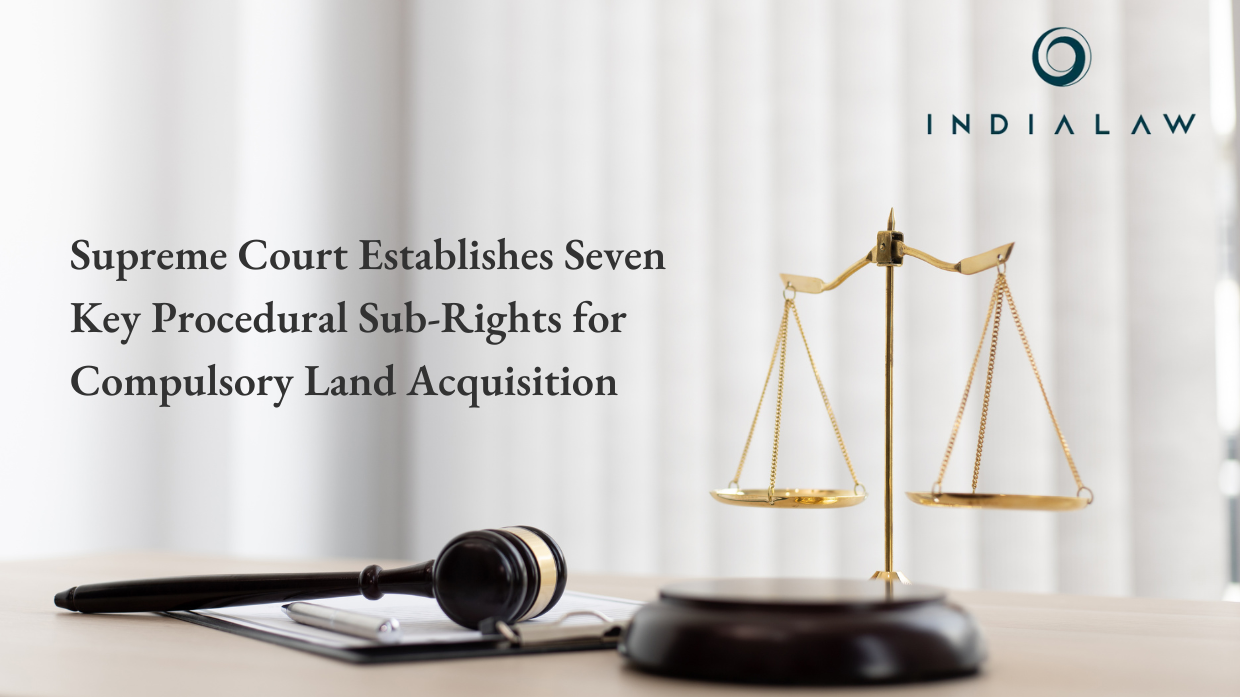Supreme Court Establishes Seven Key Procedural Sub-Rights for Compulsory Land Acquisition

Abstract: In the recent judgment of Kolkata Municipal Corporation and another v. Bimal Kumar Shah & another, the Supreme Court laid down and elaborated upon mandatory procedural safeguards and sub-rights, in tune with Article 300A of the Constitution, that must be present under any legislative enactment aimed at compulsorily acquiring land for public purposes. These seven procedural sub-rights include (i) the right to notice, (ii) the right to be heard, (iii) the right to a reasoned decision, (iv) the duty to acquire only for public purposes, (v) the right to restitution and fair compensation, (vi) the right to an efficient and expeditious process, and (vii) the right to a conclusion. These seven sub-rights are foundational components of any legislativeenactment under Article 300A of the Constitution, and the absence of any of them would render the enactmentsusceptible to judicial scrutiny and review.
Introduction to the Matter
Section 352 of the Kolkata Municipal Corporation Act, 1980(“said Act”), lays down provisions for the acquisition of land and buildings by the Kolkata Municipal Corporation (“Corporation”) for the expansion of streets and the construction of public parking spaces. The Corporation appears to have malignantly exercised the power stated under Section 352 of the said Act for the compulsory acquisition of a property from Respondent No.1 (Bimal Kumar Shah). However, both the Learned Single Judge and the Division Bench of the Calcutta High Court have concurrently held that Section 352 of the said Act does not confer any power upon the Corporation for the compulsory acquisition of land and only empowers the Corporation to acquire land through voluntary transfer.
The Supreme Court, while upholding the judgments of the Calcutta High Court, has laid down additional constitutional tests and propositions concerning the procedural regime for the compulsory acquisition of property. The Supreme Court has expanded upon the scope of rights inferred from Article 300A of the Constitution and held that a statute that only confers the power of acquisition of property and describes the compensation does not satisfy the constitutional regime of property rights laid down under Article 300A of the Constitution.
The Supreme Court has identified seven procedural sub-rights under Article 300A of the Constitution, including the right to notice, the right to a hearing, the right to reasons for the decision, the requirement to acquire property only for a public purpose, the right to fair compensation, the right to efficient conduct of the procedure within timelines, and the right to the conclusion of such proceedings. These sub-rights have become part of jurisprudence and have attained judicial recognition.
Therefore, as Section 352 failed to satisfy the procedural sub-rights under Article 300A, it cannot be considered to impart the Corporation with the power of compulsory property acquisition.
Factual Matrix
The Property in question belongs to Mr. Birinchi Shah. In 2009, Mr. Birinchi Bihari Shah filed a writ petition in the Calcutta High Court after the Corporation attempted to forcibly occupy his property. The court, finding no dispute over Mr. Shah’s title and noting the Corporation’s failure to contest with an opposing affidavit, directed an inquiry into encroachments and barred construction through a September 17, 2009 order. In 2010, Mr. Shah discovered the Corporation had removed his name and replaced it in official records, prompting him to file another writ petition seeking correction of these entries. The Calcutta High Court judge disposed of the petition, restraining the Corporation from interfering with Mr. Shah’s possession and preventing enforcement of the wrongful entries.
The Corporation, dissatisfied with this decision, filed an appeal against the order of the single judge before the Division Bench of the Calcutta High Court, arguing that their affidavit in opposition could not be filed earlier as the records were misplaced. Notably, a plea of property acquisition was raised for the first time before the Division Bench, which led to the matter being remanded back to the Single Judge after imposing costs on the Corporation. Given these developments, Mr. Birinchi Shah sought permission to withdraw the pending writ petition to file a fresh one.
Subsequently, a fresh writ petition was filed by the executor to the estate of Mr. Birinchi Shah, seeking an order to quash the alleged acquisition as illegal and restore their name as the owner in official records. The single judge of the High Court allowed the petition, examining the validity of the acquisition of the property under the said Act. The judge concluded that Section 352(a) of the said Act does not provide for the compulsory acquisition of land, thus quashing the alleged acquisition. Consequently, the Corporation appealed this decision to the Division Bench of the Calcutta High Court, which affirmed the single judge’s order and directed the Corporation to either initiate proceedings under the relevant sections of the Act or restore the names of the original owners in the Municipality’s records.
Displeased with the Division Bench’s order, the Corporation filed an appeal before the Supreme Court.
Opinion of the Supreme Court
Right to Property is a net intersection of rights.
The Supreme Court has affirmed and upheld the judgment of the Division Bench of the Calcutta High Court, while additionally emphasizing the importance of procedural safeguards when depriving anyone of immovable property. In its decision, the Supreme Court clarified that Section 352 of the said Act, only permits the Municipal Commissioner to identify and contemplate the acquisition of land required for purposes such as opening, widening, or extending streets, squares, parks, and similar public amenities. However, the provision does not outline any due process for the actual acquisition of land. Section 352 merely allows the Municipal Commissioner to contemplate which land might be needed for public purposes, but it does not confer the power for compulsory land acquisition.
Therefore, while the Municipal Commissioner can identify land for potential public use, any compulsory acquisition must adhere to the procedural safeguards and due process established under other relevant laws.
The SC was of the opinion that any legislation that calls for compulsory acquisition of property from any person or entity, must comprehensively establish a fair, just, and reasonable procedure for such acquisition and a mere provision for payment of compensation would not be satisfy the scheme of procedural safeguards under Article 300A of the Constitution.
In the SC’s opinion, even though the 44th Constitutional Amendment removed right to property as a fundamental right and moved it from the Part III to Part XII of the constitution,such an amendment would not change the fact that there still continues to be a potent safety net against arbitrary and unjust property acquisition, and simply the provision of a compensation mechanism would not save any arbitrary land acquisition mechanism from being held unconstitutional.
The seven procedural sub-rights and safeguards laid down by the SC
Right to Notice –
Receiving prior notice that the State intends to deprive an individual of their property rights is a right in itself, and an extension of the right to know embedded in Article 19(1)(a). The Constitution does not permit property acquisition by ambush. Any notice to acquire property must be clear, cogent, and meaningful.
The Right to be heard –
The right to receive a meaningful and effective prior notice of property acquisition includes the property owner’s right to communicate their objections and concerns to the acquiring authority. This right to be heard regarding the proposed acquisition must be genuine and not merely a formality.
The Right to a reasoned decision –
That the authorities have heard and considered the objections is evidenced only through a reasoned order. It is incumbent upon the authority to take an informed decision and communicate the same to the objector.
The Duty to acquire only for public purpose –
That the acquisition must be for a public purpose is inherent and an important fetter on the discretion of the authorities to acquire. This requirement, which conditions the purpose of acquisition must stand to reason with the larger constitutional goals of a welfare state and distributive justice.
The Right of restitution or fair compensation –
A person’s right to hold and enjoy property is an integral part to the constitutional right under Article 300A. Deprivation or extinguishment of that right is permissible only upon restitution, be it in the form of monetary compensation, rehabilitation or other similar means. Compensation has always been considered to be an integral part of the process of acquisition.
The Right to an efficient and expeditious process –
It is necessary for the state to be efficient in concluding the process and within a reasonable time. Completion of the process of within a reasonable time frame forms a part of the scope of rights elaborated under Article 300A of the Constitution.
The Right of conclusion –
The obligation to conclude and complete the process of acquisition is also a right underArticle 300A. Land acquisition proceedings comes to a conclusion only when the actual physical possession of the land is taken over by the state.
To summarize and repeat, the Supreme Court’s decision not only affirms the findings of the Division Bench of the Calcutta High Court but also establishes seven procedural safeguards and sub-rights that form the foundation of Article 300A of the Constitution. These rights are paramount and essential in ensuring that any individual whose property is subject to compulsory acquisition is given adequate protection in law.
By entering the email address you agree to our Privacy Policy.



